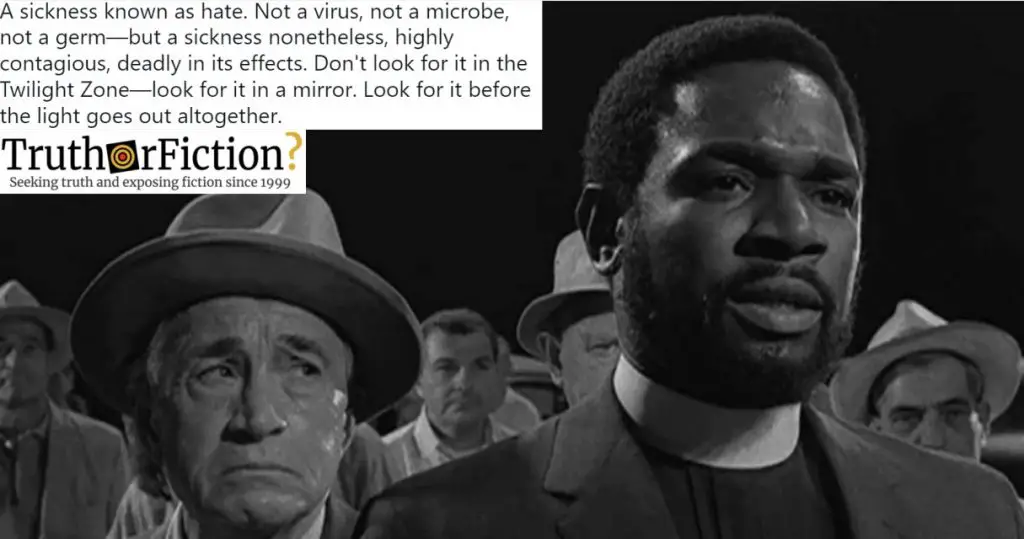A warning from a dimension “not only of sight and sound but of mind” resonated across Twitter in April 2022, thanks to a post from the daughter of the man who created it.
Anne Serling, whose father Rod created the seminal anthology series “The Twilight Zone,” shared one of his more pointed closing monologues from the show, one that addressed viewers beyond the context of the show:
Fact Check
Claim: In an episode of "The Twilight Zone," Rod Serling warned viewers to look within themselves for what he called "a sickness known as hate."
Description: In an episode of "The Twilight Zone," Rod Serling warned viewers to look within themselves for what he called "a sickness known as hate." This claim is true according to Anne Serling’s tweet which quoted one of the closing monologues of her father, Rod Serling, from the show.
A sickness known as hate. Not a virus, not a microbe, not a germ — but a sickness nonetheless, highly contagious, deadly in its effects. Don’t look for it in the Twilight Zone — look for it in a mirror. Look for it before the light goes out altogether.
It is not the first time this particular monologue from the show has sparked attention online; On January 1 2021 — the date of the annual “Twilight Zone” marathon on the Syfy Channel — actor LeVar Burton highlighted it on his own Twitter account:
Note: This section contains SPOILERS for “The Twilight Zone.”
The monologue first aired on March 27, 1964, at the conclusion of the episode “I am the Night – Color Me Black,” which is set in an unidentified town on the morning of the execution of Jagger (Terry Becker), a local man wrongfully convicted of killing a racist.
Despite the time of day, the town is shrouded by an unknown “dark cloud.” As the episode opens Serling’s narrator tells viewers:
As a matter of fact, it’s seven-thirty in the morning. Logic and natural laws dictate that at this hour there should be daylight. It is a simple rule of physical science that the sun should rise at a certain moment and supersede the darkness. But at this given moment, Sheriff Charlie Koch, a deputy named Pierce, a condemned man named Jagger, and a small, inconsequential village will shortly find out that there are causes and effects that have no precedent. Such is usually the case – in the Twilight Zone.
The remark Anne Serling quoted in her tweet ends the episode, just after viewers are told that not only has the darkness over town intensified, similar clouds have appeared over “a street in Dallas, Texas” as well as “an area over the Berlin Wall” and other locations around the world including Birmingham, Alabama and “the entire northern section of Vietnam.”
As the biography Rod Serling: His Life, Work, and Imagination by Nicholas Parisi explained, Serling’s mention of Dallas was a reference to the assassination of then-President John F. Kennedy in that city in November 1963, which to Serling represented a loss beyond politics. According to Parisi:
Serling had admired and supported Kennedy, and despite admitting that his recollections might be distorted by the circumstances of Kennedy’s death, Serling subsequently recalled Kennedy as “a gracious man, and a wise man, and a temperate man … and I think potentially this might have been the great American president. I’m not sure. But I rather think so.”
Anne Serling — who published her own biography on her father in 2013 — said on her own blog that same year that after Kennedy’s assasination, the elder Serling (who used the show as a vehicle for addressing political topics) composed a letter expanding on what the president’s death meant to him. The letter, which was never published, read:
More than a man has died. More than a gallant young President has been put to death. More than a high office of a land has been assaulted. What is to be mourned now is an ideal. What has been assassinated is a faith in ourselves. What has been murdered is a belief in our own decency, our capacity to love, our sense of order and logic and civilized decorum …
… To the Leftists and the Rightists, to the Absolutists, to the men of little faith but strong hate, and to all of us who have helped plant this ugly and loathsome seed that blossomed forth on a street in Dallas on last Friday — this is the only dictum we can heed now. For civilization to survive it must remain civilized. And if there is to be any hope for our children and theirs–we must never again allow violence to offer itself as an excuse for our own insecurities, our weaknesses and our own fears. This is not an arguable doctrine for simply a better life. It is a condition for our continued existence.
We contacted Anne Serling seeking further comment, but have yet to hear back. However, the quote is real.

